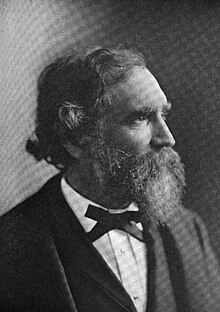Samuel Bowles
Jump to navigation
Jump to search

Samuel Stebbins Bowles (born 6 January 1939) is an American economist and Professor Emeritus at the University of Massachusetts Amherst, where he continues to teach courses on microeconomics and the theory of institutions.
Quotes
[edit]
- The view that early humans lived in worlds with little contact outside one's family--Dawkins' ideal conditions for self-interested cooperation to flourish--is difficult to square with what is known about the Late Pleistocene and early Holocene. Like Jean-Jacques Rousseau's philosophers, Dawkins, Huxley, and other biologists seem to have jumped on a faulty time machine, and have journeyed to an imaginary ancestral world.
- "A Cooperative Species: Human Reciprocity and Its Evolution", Bowles and Gintis
- Endangered liberal values would stand a better chance in a society committed to defending the weak and vulnerable, as did the early liberals, and to insuring people against the economic insecurities that inevitably accompany a technologically dynamic and cosmopolitan economy.
- "The end of liberalism", Boston Globe (June 20, 2017)
Understanding Capitalism: Competition, Command, and Change (2005)
[edit]Samuel Bowles, Richard Edwards, and Frank Roosevelt. Understanding Capitalism: Competition, Command, and Change (3rd ed., 2005).
- The point of Darwin's statement is clear: in competitions among groups, those whose members have learned how to cooperate—that is, not to compete with one another—often win. Think of team sports. Darwin spoke of tribes as groups that would benefit from having a preponderance of cooperative members. The same reasoning applies to firms, neighborhoods, ethnic groups, and nations.
- p. 50
- The first dimension is called "competition," and it refers to that aspect of an economic system in which exchanges of one sort or another play the most important part. In capitalism, of course, competition and exchange occur primarily in markets.
- p. 54
- The second dimension is called "command," and it refers to those aspects of economic relationships that involve power, coercion, hierarchy, subordination, or authority. In capitalist (and many other) societies, command is a central aspect of the workplace, the household, and the government. It concerns relations among nations, classes, races, men, women, and other groups in society as well.
- p. 54
- The third dimension of three-dimensional economics, change, suggests that studying economics also means studying history. The process of change in society cannot be understood without considering the past and how it changed, eventually becoming the present. Change in political economy may be contrasted with the static approach of conventional economics that freezes time at a moment.
- p. 57
- The aristocratic and the modern were inextricably combined in Joseph Schumpeter. The paradoxes of this great economist, who also served as minister of finance in the post-World War I government of Austria, are suggested by the fact that at his first teaching post, he challenged the university librarian to a duel to win freer access to books for the students. Perhaps Schumpeter was attracted to the big issues because he himself witnessed drastic changes in society.
- p. 79
- Keynes was no revolutionary, but his ideas revolutionized 20th-century economics.
- p.82
- Writers after Coase have referred to the authority structure of the firm as a "visible hand" that works in combination with Smith's invisible hand. The everyday fact that employers exercise power over their employees — not news to most employees — had been a central theme in Marx's economics, but it was (and generally continues to be) overlooked by most neoclassical economists. Early in his studies Coase noted the similarity between the hierarchical organization of capitalist firms, with their reliance on command relations, and the then-existing system of centralized economic planning in the Communist countries, where production was carried out in accordance with orders from higher authorities and where market competition played little role.
- p. 85
- The point is that coordination can be achieved by either of two means: (1) with no one dictating anyone else's precise behavior, but everyone observing a set of rules, or (2) with someone (or perhaps more than one) directing the behavior of others. We refer to the first of the two means as coordination by rules and the second as coordination by command.
- p. 202
